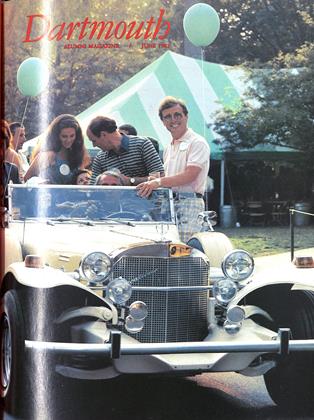Philosopher Max Black, spring-term Montgomery Fellow, gave his first Dartmouth lecture on the neglected topic of humbug, which has, he said, come to fascinate him. Russian-born and educated in Britain, Black came to this country during World War II and joined the faculty of Cornell, where in 1954 he became Sage Professor of Philosophy and Humane Letters. A brilliant and versatile thinker, he is the second American philosopher to hold the position of president of the' International Institute of Philosophy.
Black promised his hearers an entertaining lecture but cautioned them against missing his serious intent. He noted that the term "humbug" is often applied, Scrooge-like, to content alone, in which cases it is synonymous with "stuff and nonsense," "balderdash," "bunkum," and similar terms of contemptuous dismissal. Given all those synonyms, Black proposed reserving "humbug" for those occasions when something needs to be said not only about content but also about the stance of the speaker.
The lecture stepped along nicely through fields of anecdote toward the following philosophically derived definition. Humbug is a deceptive misrepresentation characterized most notably by pretentious word or deed. "It's not lying," said Black, "but it is akin to lying. It resembles cant, and it has to do with pretentiousness, pretense, affectation, insincerity, and deceptiveness, and there is a detectable whiff of self-satisfaction about it, of clever-meism. If, for instance, I ask, 'Do you know the way to the campus?' and you reply simply, 'Yes,' and stop, certain linguistic presuppositions have been violated. The background conditions for communication have been eroded, and if that sort of thing becomes prevalent, communication becomes impossible. Humbug is insidious and more dangerous than lying, because you cannot catch it out."
Black offered in conclusion several short-term remedies for coping with humbug. His first remedy was a formula derived from a response once employed by G. B. Shaw, which Black dubbed "the Shavian probe": "Ask the naive and rather impolite question, 'Do you really believe that?' And if the answer should be yes, I recommend commenting simply, 'How very extraordinary.' " Another ploy recommended was to take the humbug literally in order to reveal its absurdity, by, for instance, replying to a humbugger's, "Ah, but exception proves the rule!" with, "Yes, and so the more exceptions the better the rule." Learned humbug Black characterized as too many clothes and no emperor, and he suggests coping with it by translating it into clear and effective English.
His final remedy was to cultivate by way of preventive medicine a close acquaintance with the works of various "antihumbuggers," such as Jonathan Swift, Russell Baker, Samuel Butler, and Morris Udall.
 View Full Issue
View Full Issue
More From This Issue
-
 Feature
FeatureThe Lovinses and the Soft-Energy Path
June 1982 By Rob Eshman '82 -
 Feature
FeatureMAIN STREET
June 1982 By Nancy Wasserman -
 Cover Story
Cover StoryWarming up for 50 years: The yeast of elderly innocence
June 1982 -
 Class Notes
Class Notes1932
June 1982 By Adrian A. Walser -
 Sports
SportsBig Enough
June 1982 By Brad Hills '65 -
 Class Notes
Class Notes1948
June 1982 By Francis R. Drury Jr.








